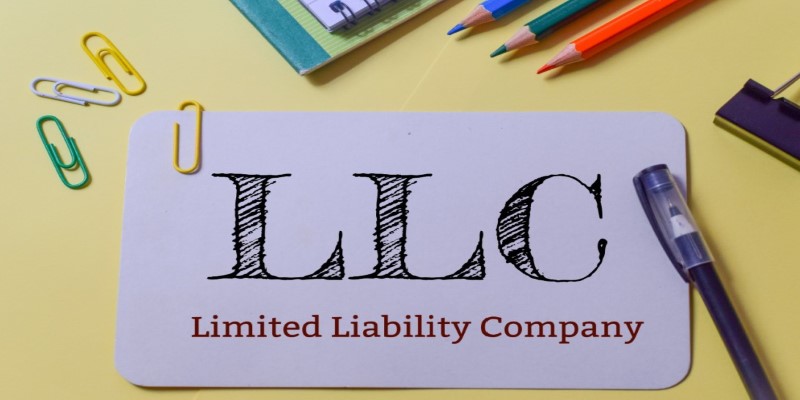Your Ultimate Step-by-Step Guide: How to Get an LLC for Your Business
Mar 19, 2024 By Susan Kelly
So, you're ready to start your own business? Congratulations! Getting an LLC is one of the first steps you'll need to take. But what exactly is an LLC, and how do you get one? Don't worry; we've got you covered. In this guide, we'll explain everything you need to know about forming an LLC for your business.

What is an LLC, anyway?
Before we discuss how to get an LLC, let's first understand what it is. LLC stands for Limited Liability Company. Its a business structure that combines the limited liability protection of a corporation with the flexibility and simplicity of a partnership or sole proprietorship. In simpler terms, it is a way to protect your personal assets while running your company.
Perks of Getting an LLC
Getting an LLC offers several advantages for business owners. They can protect their personal assets, enjoy tax advantages, and position their business for long-term success.
Limited Liability Protection: One of the primary reasons to get an LLC is for the limited liability protection it provides. The owner's assets are typically protected from business debts and liabilities. In the event of a lawsuit or bankruptcy, personal assets such as homes and savings are generally not at risk.
Flexibility in Management: Unlike corporations, LLCs offer more flexibility in management structure. Owners, known as members, can decide how they want to manage the company without being bound by strict corporate formalities.
Tax Benefits: LLCs offer flexibility in taxation. By default, they are treated as pass-through entities, meaning profits and losses are passed on to the owners' tax returns. This can result in potential tax savings compared to corporate taxation.
Credibility and Professionalism: An LLC can add credibility and professionalism to your business. It shows potential clients, partners, and investors that you are serious about your business and have taken the necessary steps to establish a formal legal entity.
Easier Access to Funding: Sometimes, having an LLC may make it easier to secure financing or attract investors. It provides a clear structure for ownership and management, which can instill confidence in potential lenders or investors.
Passing on Ownership: LLCs offer ease in transferring ownership interests. If a member wants to leave the business or transfer their ownership stake to someone else, it can typically be done with minimal hassle.
Step-by-Step Guide to Getting an LLC
Now that you've clearly understood the steps in setting up an LLC let's delve deeper into each stage to ensure you're well-prepared for the process ahead. Each step is crucial in establishing your business entity and setting the foundation for its operations.

Now that you know what an LLC is, let's discuss how to get one.
Step 1: Choose a Name for Your LLC
The first step in getting an LLC is choosing a name for your business. Your company name should be unique and not already used by another LLC in your state. You'll also need to ensure your name complies with state-specific naming requirements.
Step 2: File Articles of Organization
Once you've chosen a name for your LLC, the next step is to file Articles of Organization with your state's Secretary of State office. This document officially establishes your LLC and includes important information such as your company name, address, and the names of its members.
Step 3: Create an Operating Agreement
While not required in all states, creating an operating agreement for your LLC is a good idea. This document outlines your company's ownership and management structure and can help prevent disputes among members down the road.
Step 4: Obtain an EIN
Employer Identification Number (EIN) is a unique 9-digit number allocated to your business by the IRS. You'll need an EIN for hiring employees, tax purposes, opening a business bank account, and more.
Step 5: Comply with State and Local Requirements
Depending on your location and the nature of your business, you may need to obtain licenses and permits at the state and local levels. Make sure to research and comply with all applicable requirements to avoid any legal trouble down the road.
Step 6: Register for Taxes
Finally, don't forget to register your LLC for state and federal taxes. This typically involves obtaining a state tax ID number and registering for taxes with the IRS.
Tips for Setting Up LLC
As you embark on the journey of setting up your LLC, here are some tips and tricks to keep in mind:

Research Thoroughly: Before diving in, take the time to research the requirements and regulations specific to your state. Understanding the process beforehand can save you time and prevent headaches.
Choose a Memorable Name: Your LLC's name is vital to your brand identity. Select a name that reflects your business and is memorable and easy to spell.
Check Name Availability Early: Before getting too attached to a name, conduct a thorough search to ensure it's available. This prevents any delays or complications later in the process.
Consider Professional Help: While setting up an LLC can be done independently, seeking professional assistance, such as from a lawyer or accountant, can provide valuable guidance and ensure everything is done correctly.
Plan for the Future: As you draft your operating agreement, consider potential scenarios and how to handle them. Being proactive can help prevent conflicts and misunderstandings among members.
Keep Records Organized: From filing paperwork to tracking expenses, maintaining organized records is essential for the smooth operation of your LLC and simplifies tax filing processes.
Stay Compliant: Regulations and requirements may change over time, so make it a priority to stay informed and ensure ongoing compliance with state and federal laws.
Congratulations, You're Now an LLC Owner!
And there you have it a step-by-step guide to getting an LLC for your business. While the process may seem daunting at first, it's entirely manageable with a little bit of research and effort. By following these steps, you'll be well on your way to starting your own company and achieving your entrepreneurial dreams. Good luck!

Triston Martin Nov 07, 2023
Ways to Manage Currency Exchange in New York City
84961

Susan Kelly Feb 06, 2024
Investing in Vertex: Essential Steps to Purchase Vertex Stock Successfully
70623

Susan Kelly Nov 09, 2023
Learn About: What Are the Benefits of Paying Cash for a Home?
8082

Triston Martin Sep 20, 2024
Parabolic SAR Indicator: Formula, Settings, and Strategies Explained
20508

Verna Wesley Sep 06, 2024
Noncovered Securities Defined: What Investors Need to Know
59174

Susan Kelly Jan 10, 2024
Global Wealth Inequality: A Look at Gini Coefficients Around the World
48472

Susan Kelly Nov 21, 2023
The Essentials of Small Business Taxes
53232

Susan Kelly Nov 18, 2023
What to Do If Your Tenant Breaks the Lease
93842